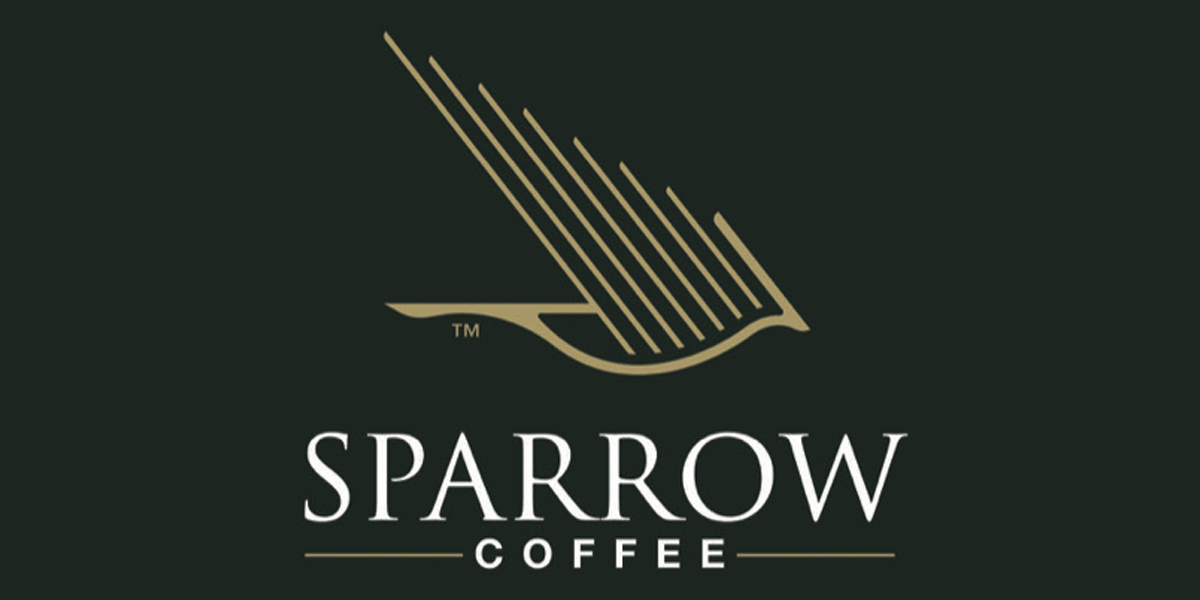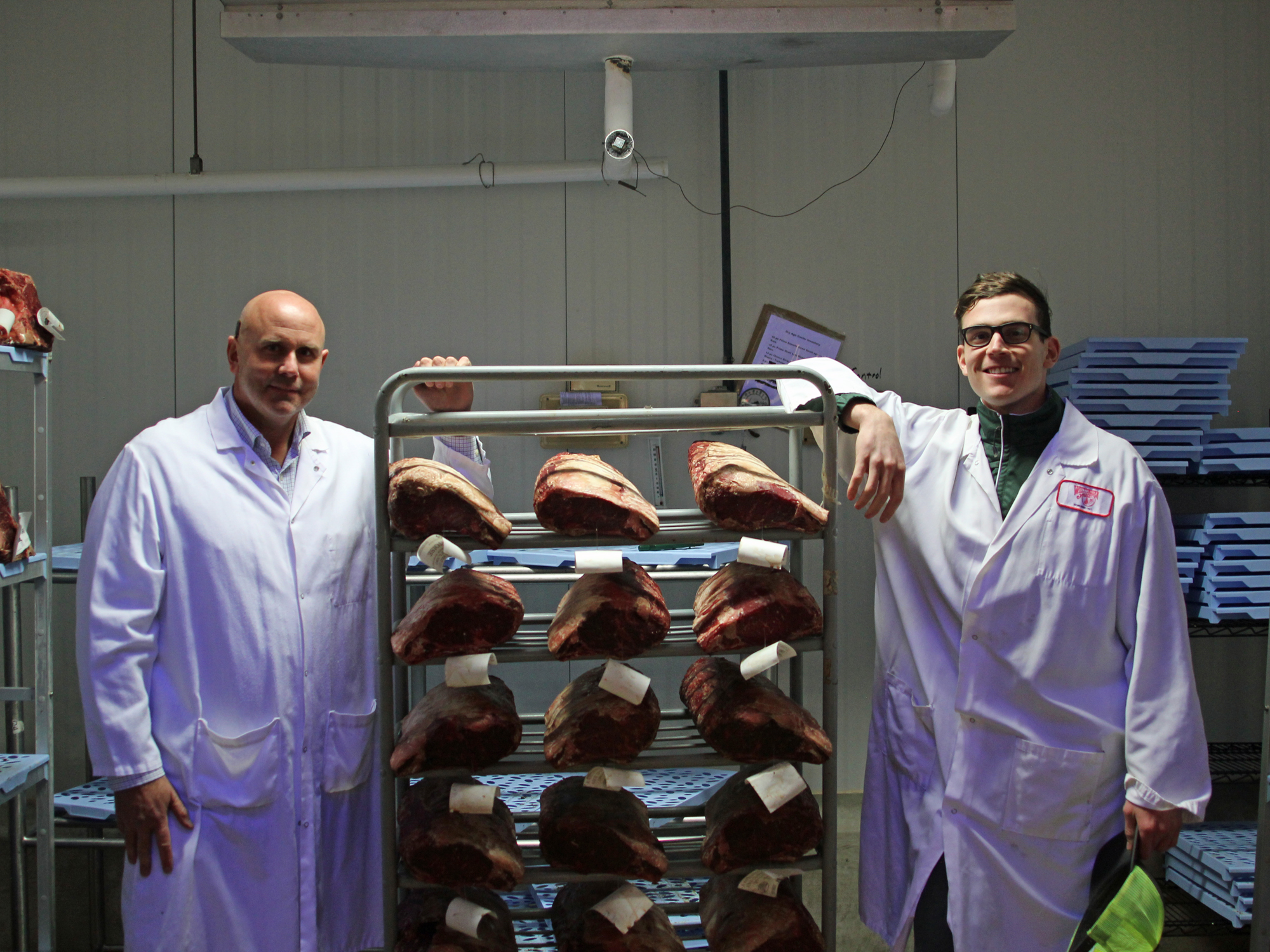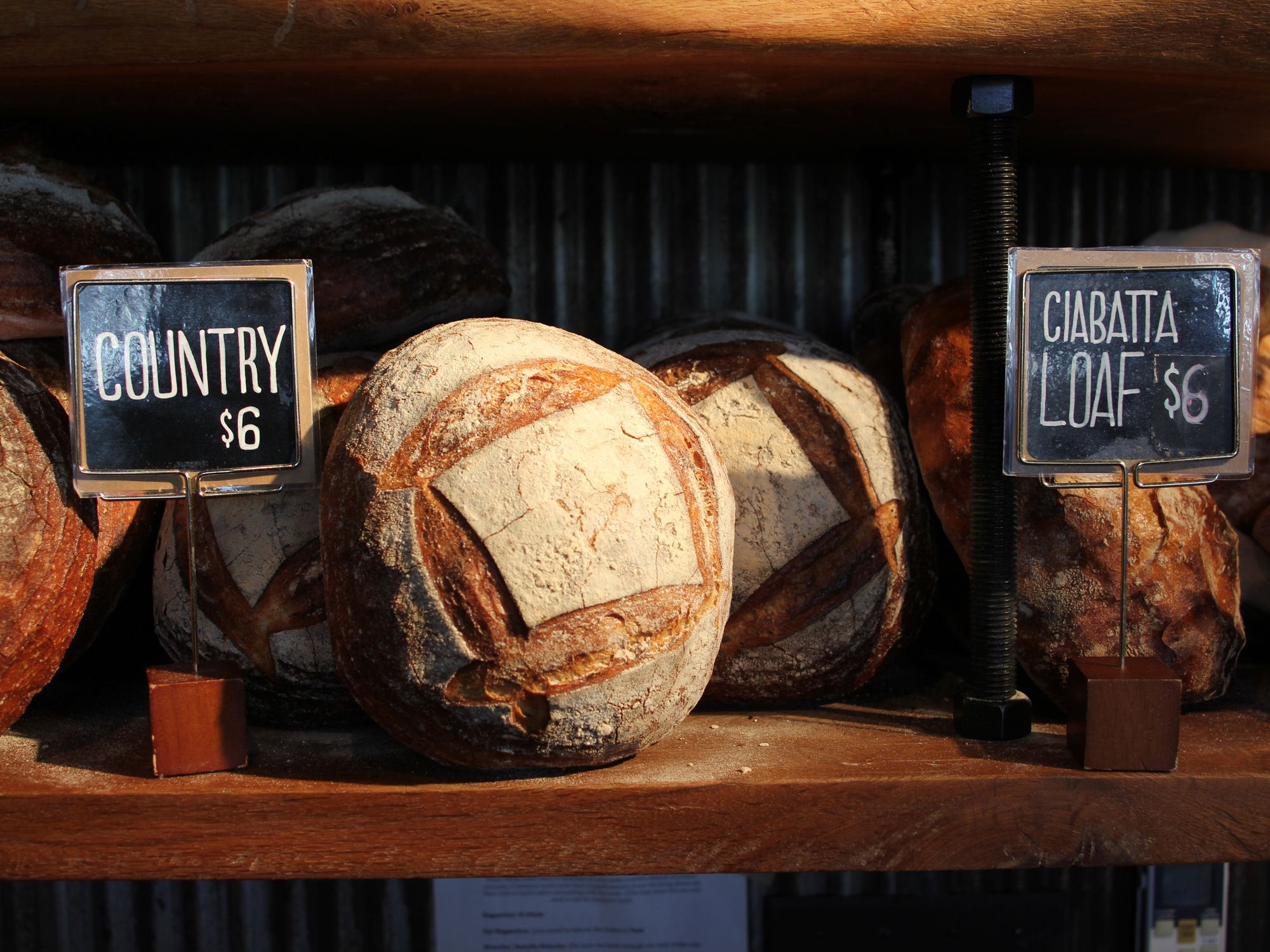SAMUEL TAYLOR IS OBSESSED WITH PANCAKES. The 34-year-old actor-pancake entrepreneur’s obsession began in 2010 with a dare from a fellow actor, and has developed into Long Table Pancakes, an artisanal pancake-mix business he started in late 2015. After offering three mixes featuring locally sourced whole grains at farmers markets and a handful of retail locations for the last couple of years, he’s on the cusp of an expansion that will allow him to sell to larger stores and restaurants.
A late-night debate with fellow actor Rachael Jenison sparked the dare. She maintained that pancakes mixes were a “demonstrable force for good,” because they encouraged people to eat pancakes, instead of more highly processed fast food. He argued that store-bought mixes were the essence of evil because they made bad pancakes easy, so that’s what people ate. Her retort: “Can you do better?”
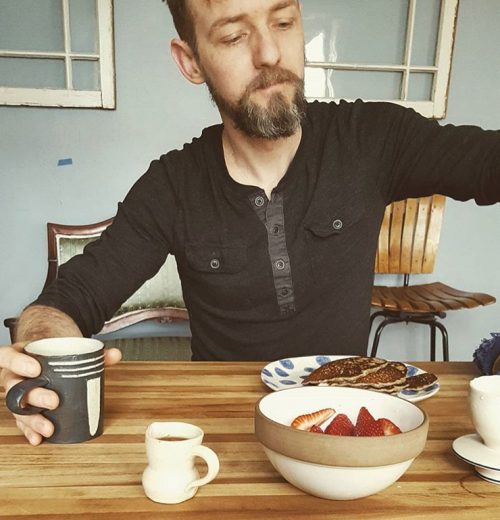
Samuel Taylor and friends
An accidental acquisition helped Taylor take on the challenge. He’d just moved into his first Chicago apartment after being on tour, and found a cast-iron griddle abandoned on the back stairs. A friend who was an actor and pastry chef taught him how to re-season it, and he started making pancakes four or five times a week. “I quickly discovered that it wasn’t hard to outdo the boxed mixes of the time,” he says, “and I really got interested in grains.”
Along the way, he’d met fellow Lookingglass Theatre Company artistic associate Lindsey Noel Whiting when they were both working on “Lookingglass Alice,” but they didn’t start dating until he was well into the pancake project. “By then, I was refining my recipes, and since actors don’t get to go on dinner dates because they’re working, I’d impress her with my breakfast cooking skills instead,” he explains. They got married in September, 2016.
Taylor’s pancake repertoire blossomed to seven or eight varieties with quirky names like Baltimore, Red Queen, and Montana Feliz. This last recipe had 18 ingredients, a couple of them drawn from childhood memories.
One of the components, blue corn, is ubiquitous in Albuquerque, NM, where Taylor grew up, and he first ate it in the pancakes his mother made. “I remember her in a yellow apron pouring the batter into a frying pan when I was five or six, and I’ve been trying to replicate the taste,” he says. Only when he was older did he realize that she was buying a mix and adding the blue corn flour to it.
People used popcorn flour during World War II and some made it in blenders, but I didn’t know that at the time.
An even more unusual ingredient, flour made from popped popcorn, dates to a recollection from his teenage years. “I remember a friend’s father using it in his waffles,” Taylor says, “but the funny thing is that I seem to have fabricated the memory. People used popcorn flour during World War II and some made it in blenders, but I didn’t know that at the time.”
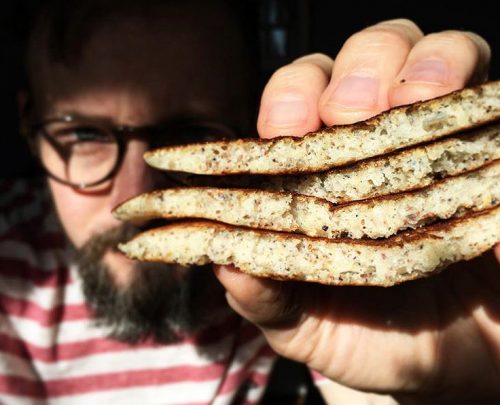
Soft red winter wheat, rye, buckwheat and oat flours were among the other ingredients in Montana Feliz, but when he started selling the mixes, Taylor knew he had to decide which recipes to focus on, so he could tailor them for larger batches and figure out sourcing. He basically split Montana Feliz into two recipes: a hearty lumberjack style he called Windy Point, and a festive brunch type named White Knight, for a role he’s played several times in “Lookingglass Alice.”
Windy Point ended up being predominantly blue corn and rye flours with buckwheat for texture and hazelnut meal for richness, as well as salt, baking powder and a little sugar. The White Knight is mostly oat flour, soft red winter wheat and almond meal by weight, but half the volume is the popcorn flour, which Taylor describes as being like “fairy dust.” Last summer, he added gluten-free 1776 to the lineup, a classic diner style pancake that’s mainly sorghum and blue corn flours with whole-grain teff and almond meal.
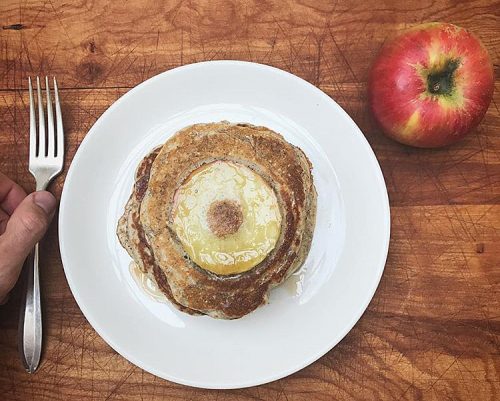
ONCE HE HAD THE RECIPES, HE HAD to find farmers and millers. Taylor is committed to the idea that our great-great grandchildren should be able to enjoy food as wholesome and good as our great-great grandparents—the name Long Table Pancakes reflects how he pictures this continuum of food traditions—so he wanted sources as close to home as possible. But he was new to the business, so everything was a learning process.
He got some help from Gilbert Williams of Lonesome Stone Milling in Lone Rock, Wisconsin, whom he met when he was acting with American Players Theatre in Spring Green. Williams put him in touch with Wisconsin farmers, and now grinds organic blue corn from Dave Dolan in Dodgeville, whole-grain rye grown by Larry Dammen near Argyle, and the whole-grain soft red winter wheat from Terry Sprecher of rural Lone Rock for Long Table.
Hodgson Mill in Effingham, Illinois grinds the organic whole-grain oats grown by farmers within 70 miles of the town, plus the almond meal from unblanched almonds grown in California (nuts don’t grow well in the Midwest), while Bob’s Red Mill in Milwaukie, Oregon, grinds the organic whole-grain dark buckwheat and hazelnuts, both from the Pacific Northwest.
“I’m looking for a local source for the buckwheat,” Taylor says, “but I haven’t found one with the right color and flavor yet.” He’s also had discussions with suppliers and the staff at Local Foods about details like the grind of the blue corn, the consistency of the oat flour and how much oat bran it should have.
The biggest hurdle was finding popcorn flour. The whole-grain popcorn is a blue varietal grown by Andrew and Karlie Bowman of Pilot Knob farm, in Oneida, IL, but Taylor couldn’t find anyone to mill it. So he air-pops and stone mills it himself in small batches. “No one, as far as I know, has equipment to process anything that large and light weight, and we had to adapt a mill to be able to do it,” he explains. “A lot of people told me to ditch the popcorn flour, but I wanted to make the best possible pancake, which sometimes requires doing things the hard way.”
Taylor makes the mixes at the Lakeview Kitchen and Market, a shared facility. Using a food-grade mixer, he typically turns out three 90-lb batches a day with help only from his mom, his wife, and sometimes his dad. He usually buys 50-150 lbs of each ingredient at a time. “Our production is very small, but whole grains have a limited shelf life, and achieving the complex balance of flavors requires that the grains be fresh,” he says.
Long Table mixes are currently available at Potash Market on State St., Provisions in Rogers Park and Uptown, Harvestime Foods in Lincoln Square, Southport Grocery and Cafe, Baker Miller and several other retail locations, as well as online and at the Andersonville and Logan Square farmers markets, where nickel-size sample pancakes are a signature. Taylor estimates that sales were around $10,000 the first year and closer to $35,000 in 2017. “White Knight has a slight edge overall and sells best online,” he says. “In Andersonville, they prefer Windy Point; in Logan Square, 1776.”
But he’s working with a commercial blending company in Johnsburg, Illinois to ramp up production in hopes of getting into more retail markets and local restaurants like (speaking of pancakes in high volume) the Bongo Room. In the meantime, that’s not all he’s up to—you can see Taylor himself in Chicago Shakespeare Theater’s “Macbeth” April 25-June 24. He plays Ross, cousin of Macduff, a character he says he loves that no one ever remembers—unlike the pancakes you grew up on, that your mother made.
Anne Spiselman is a freelance writer who has covered food, wine, and culture for decades. She’s a frequent contributor to Crain’s Chicago Business and Edible Chicago and has written for most local publications and some national ones.
Latest
Join the Discussion
After you comment, click Post. If you're not already logged in you will be asked to log in or register with Disqus.




